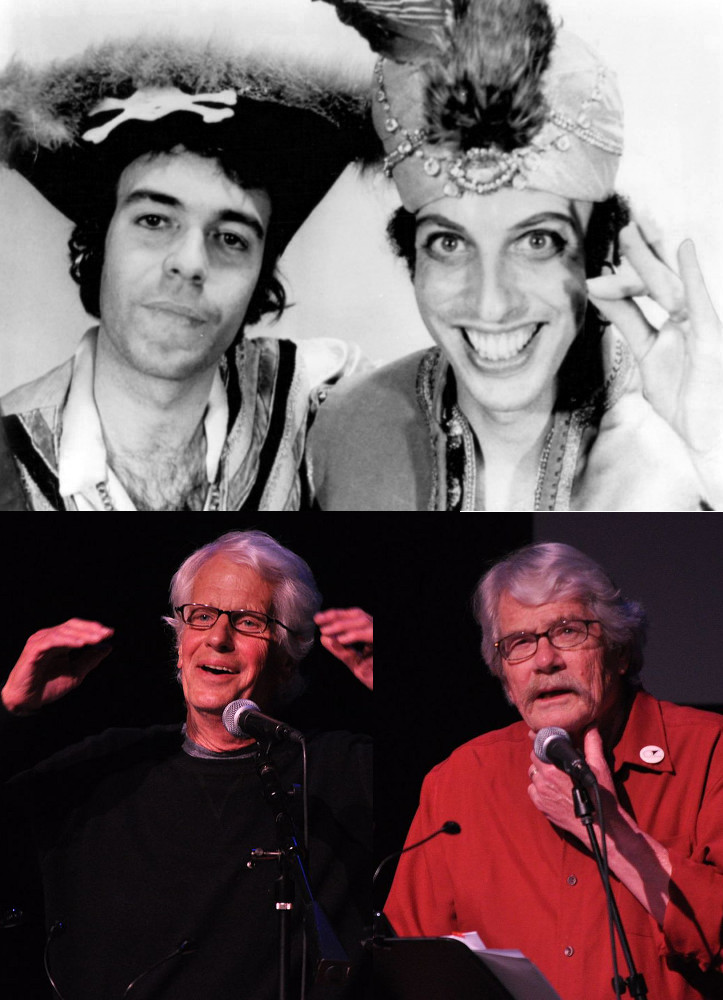The Firesign Theatre: Difference between revisions
added photo |
No edit summary |
||
| Line 1: | Line 1: | ||
<center>[[Image:Firesign_Theatre.jpg|The Firesign Theatre]] |
<center>[[Image:Firesign_Theatre.jpg|The Firesign Theatre]] |
||
<br />''Left to right: Phil Proctor, Peter Bergman, Phil Austin, and David Ossman''</center> |
<br />''Left to right: Phil Proctor, Peter Bergman, Phil Austin, and David Ossman in 2001''</center> |
||
'''The Firesign Theatre''' is a [[comedy]] troupe consisting of [[Phil Austin]], [[Peter Bergman (comedian)|Peter Bergman]], [[David Ossman]], and [[Philip Proctor]]. The troupe began as live [[radio]] performers in [[Los Angeles, California]] on radio stations [[KPPC]] and [[KPFK]] during the late [[1960s]] and early [[1970s]]. |
'''The Firesign Theatre''' is a [[comedy]] troupe consisting of [[Phil Austin]], [[Peter Bergman (comedian)|Peter Bergman]], [[David Ossman]], and [[Philip Proctor]]. The troupe began as live [[radio]] performers in [[Los Angeles, California]] on radio stations [[KPPC]] and [[KPFK]] during the late [[1960s]] and early [[1970s]]. |
||
Revision as of 22:47, 12 November 2005

Left to right: Phil Proctor, Peter Bergman, Phil Austin, and David Ossman in 2001
The Firesign Theatre is a comedy troupe consisting of Phil Austin, Peter Bergman, David Ossman, and Philip Proctor. The troupe began as live radio performers in Los Angeles, California on radio stations KPPC and KPFK during the late 1960s and early 1970s.
The name is an astrological reference: The members consist of an Aries (Austin), a Leo (Proctor), and two Sagittarians (Bergman and Ossman). The name also is intended as a pun on "Fireside Theatre," a popular radio show from the nineteen-thirties.
Called "The Beatles of Comedy" by their admirers, the Firesign Theatre specialize in audio recordings, having had relatively little presence in stage performance, television or movies. Over the course of their career, they have sold more audio recordings in total than any other comedy act. Their first four albums in particular are considered classics of recorded comedy. (Each of those four albums features a different one of the four members in a leading role.)
While their free-flowing, stream of consciousness style has the feel of improvisational comedy and may derive from improvisational processes, most of it actually is tightly scripted and memorized (a situation not unlike that of Britain's Monty Python troupe, to whom Firesign are often compared). They have employed a writing method that demands the consent of all four members before a line can be included. Much of their work has been copyrighted under the name "4 or 5 Crazee Guys," reflecting their collective sentiment that there is a "fifth guy in the room" who actually is doing all the writing.
Because of their complexity, Firesign recordings tend to become funnier with repeated listenings as new jokes are revealed, and their high production values provide an additional layer of aesthetic pleasure that endears them to audiophiles. Similarly, Firesign Theatre productions take place in a satirical world with many subtle and oblique references to mass culture which fans enjoy decoding. See A Firesign Theatre lexicon for the perplexed.
The title tracks of their first two albums, and all of the next two, were published in script form as The Firesign Theatre's Big Book of Plays.
The group cowrote the screenplay to the offbeat comedy Western Zachariah, released in 1971.
During the mid-1970s, the group more or less split in half: Firesign productions continued, but Proctor and Bergman also performed as a duo, and Austin and Ossman worked individually and together in a few stage shows and most notably the in writing and production of In the Next World, You're on Your Own. In the mid-1980s, Ossman temporarily left the group to produce shows for National Public Radio.
Their recordings through 1975 were originally released by Columbia Records and may be currently available from Rhino Records.
Discography
- Waiting for the Electrician or Someone Like Him (1968)
- How Can You Be in Two Places at Once When You're Not Anywhere at All (1969)
- Don't Crush That Dwarf, Hand Me the Pliers (1970)
- I Think We're All Bozos on This Bus (1971)
- Dear Friends (1972)
- Not Insane (1972)
- How Time Flys (1973) (a "solo" album written and presented by Ossman, but with all members performing, among others)
- The Tale of the Giant Rat of Sumatra (1974)
- Everything You Know Is Wrong (1974)
- Roller Maidens From Outer Space (1974) (a "solo" album written and presented by Austin, with other members performing)
- In the Next World, You're on Your Own (1975) (credited only to Austin and Ossman as writers, but performed by all)
- Just Folks . . . A Firesign Chat (1977)
- Anythynge You Want To (1977)
- The Case of the Missing Shoe (1979)
- Fighting Clowns (1980)
- Lawyer's Hospital (1982)
- The Three Faces of Al (1984) (without Ossman)
- Eat Or Be Eaten (1985) (without Ossman)
- Pink Hotel Burns Down (1998)
- Give Me Immortality or Give Me Death (1998)
- Boom Dot Bust (1999)
- RadioNow Live! (2001)
- Bride of Firesign (2001)
- Papoon For President (2002)
- All Things Firesign (2003)
